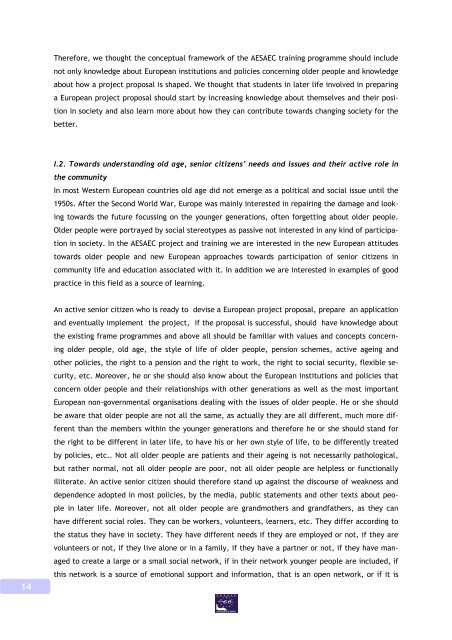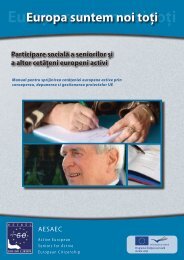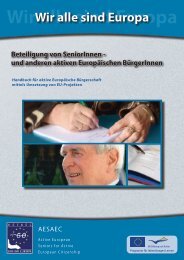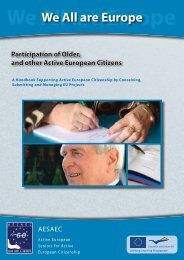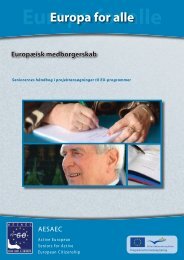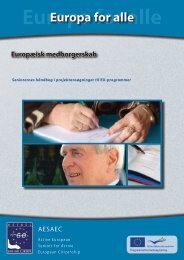We All are Europe - AESAEC
We All are Europe - AESAEC
We All are Europe - AESAEC
Create successful ePaper yourself
Turn your PDF publications into a flip-book with our unique Google optimized e-Paper software.
Therefore, we thought the conceptual framework of the <strong>AESAEC</strong> training programme should include<br />
not only knowledge about <strong>Europe</strong>an institutions and policies concerning older people and knowledge<br />
about how a project proposal is shaped. <strong>We</strong> thought that students in later life involved in preparing<br />
a <strong>Europe</strong>an project proposal should start by increasing knowledge about themselves and their position<br />
in society and also learn more about how they can contribute towards changing society for the<br />
better.<br />
I.2. Towards understanding old age, senior citizens’ needs and issues and their active role in<br />
the community<br />
In most <strong>We</strong>stern <strong>Europe</strong>an countries old age did not emerge as a political and social issue until the<br />
1950s. After the Second World War, <strong>Europe</strong> was mainly interested in repairing the damage and looking<br />
towards the future focussing on the younger generations, often forgetting about older people.<br />
Older people were portrayed by social stereotypes as passive not interested in any kind of participation<br />
in society. In the <strong>AESAEC</strong> project and training we <strong>are</strong> interested in the new <strong>Europe</strong>an attitudes<br />
towards older people and new <strong>Europe</strong>an approaches towards participation of senior citizens in<br />
community life and education associated with it. In addition we <strong>are</strong> interested in examples of good<br />
practice in this field as a source of learning.<br />
14<br />
An active senior citizen who is ready to devise a <strong>Europe</strong>an project proposal, prep<strong>are</strong> an application<br />
and eventually implement the project, if the proposal is successful, should have knowledge about<br />
the existing frame programmes and above all should be familiar with values and concepts concerning<br />
older people, old age, the style of life of older people, pension schemes, active ageing and<br />
other policies, the right to a pension and the right to work, the right to social security, flexible security,<br />
etc. Moreover, he or she should also know about the <strong>Europe</strong>an institutions and policies that<br />
concern older people and their relationships with other generations as well as the most important<br />
<strong>Europe</strong>an non-governmental organisations dealing with the issues of older people. He or she should<br />
be aw<strong>are</strong> that older people <strong>are</strong> not all the same, as actually they <strong>are</strong> all different, much more different<br />
than the members within the younger generations and therefore he or she should stand for<br />
the right to be different in later life, to have his or her own style of life, to be differently treated<br />
by policies, etc.. Not all older people <strong>are</strong> patients and their ageing is not necessarily pathological,<br />
but rather normal, not all older people <strong>are</strong> poor, not all older people <strong>are</strong> helpless or functionally<br />
illiterate. An active senior citizen should therefore stand up against the discourse of weakness and<br />
dependence adopted in most policies, by the media, public statements and other texts about people<br />
in later life. Moreover, not all older people <strong>are</strong> grandmothers and grandfathers, as they can<br />
have different social roles. They can be workers, volunteers, learners, etc. They differ according to<br />
the status they have in society. They have different needs if they <strong>are</strong> employed or not, if they <strong>are</strong><br />
volunteers or not, if they live alone or in a family, if they have a partner or not, if they have managed<br />
to create a large or a small social network, if in their network younger people <strong>are</strong> included, if<br />
this network is a source of emotional support and information, that is an open network, or if it is


